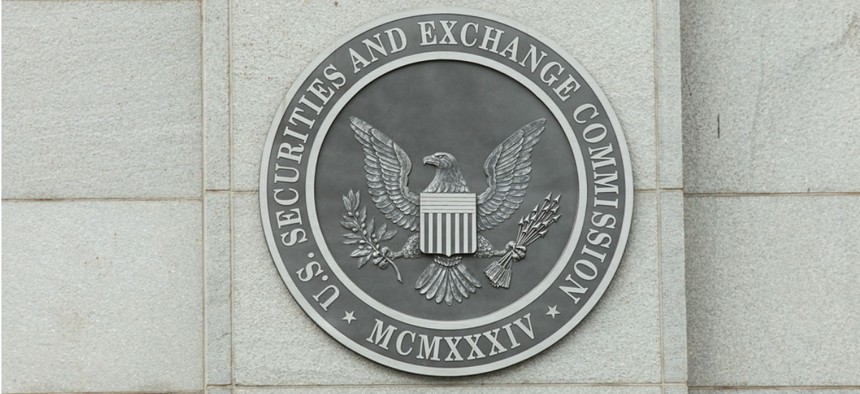
Mark Van Scyoc / Shutterstock.com
SEC Pressured to Standardize Financial Reporting
Transparency advocates in Congress cite industry and global movement.
Among the best ways to head off the next Enron or Bernie Madoff-level financial fraud, according to a pair of lawmakers, is to require federal regulators to more fully embrace consistent data formats for the information they collect on financial transactions.
Reps. Darrell Issa, R-Calif., and Mike Quigley, D-Ill., summoned industry and nonprofit transparency advocates to a panel last week to talk up their Financial Transparency Act (H.R. 2477). It would write into law the requirement for standardized reporting formats that are being considered voluntarily by agencies such as the Securities and Exchange Commission and the Commodity Futures Trading Commission.
U.S. regulators should join a global industry push to standardize parties who buy and sell with a universal 20-digit “legal entity identifier,” Issa said. “We won’t have another Madoff if someone who sees it can report it, and we won’t have that if the SEC only opens an investigation,” Issa said. A standardized identifier, he added, cuts compliance costs for industry, allows regulators to exploit data analytics and provides transparency for investors to equalize their differing advantages. "We need to get to precision that only comes with all [financial] information being available equally to the large and the small,” Issa said.
The lawmakers’ hope-for “transition to structured data,” part of the agenda of the nonprofit Data Transparency Coalition that organized the panel with the Congressional Transparency Caucus, addresses “a fundamental lack of trust around the country in what we do,” Quigley said. “People don’t know what we in Washington are basing decisions on to remove corruption.” Most regulations, he said, treat financial reporting as a “static document, like a pdf, which are very nice but lock valuable data away” that could be analyzed for trends. The SEC, he said, is making progress toward standardized reporting, but the effort is “stalled.”
Their bill, which has 28 sponsors, would require standardized corporate financial data that identifies parties to each transaction to be adopted by the Treasury Department’s Office of Financial Research, SEC,CFTC, the Federal Deposit Insurance Corporation, Office of the Comptroller of the Currency, the Consumer Financial Protection Bureau, the Board of Governors of the Federal Reserve System, the Commodity Futures Trading Commission, the National Credit Union Administration and the Federal Housing Finance Agency.
Proponents point to a worldwide effort in government and the private sector to create a standardization reporting identification system so that firms and regulators can monitor their financial exposure and risk.
“Data in the financial world is a total mess,” said panelist Allan Mendelowitz, former chairman of the Federal Housing Finance Board. “It’s like 19th-century manufacturing, when steam engines were blowing up because there were no standards for nuts and bolts.” He estimated that if U.S. financial regulatory agencies adopted consistent data formats for the information they collect instead of using today’s document-based reports, a typical large investment firm could save 20 percent to 30 percent of operating expenses, or $200 million to $300 million annually,” which would be a “win-win” for both the financial and regulatory communities.
Financial trade groups such as the Securities Industry and Financial Markets Association in May released an industry consensus report favoring the standard titled Requirements for a Global Legal Entity Identifier (LEI) Solution. The private global company Depository Trust and Clearing Corp. recently wrote to the SEC touting the legal entity identifier clearinghouse it built for the CTFC. It has already assigned identifiers to 185,000 legal entities in 140 jurisdictions around the world, its letter said.
SEC Commissioner Kara Stein is on board, having told an industry group in April that the clearinghouse “will provide great benefits to both regulators and market participants at relatively minimal cost.” In a June speech, Stein added, “I will work to ensure that LEI is appropriately included in every SEC rule where a legal entity needs to be identified.”
SEC also circulated a global progress report published last month on adoption of legal entity identifiers as called for in 2011 at the G-20 economic summit.
Whether the voluntary progress is sufficient to head off legislation to require its adoption remains to be seen. The push is “being resisted by some U.S. agencies,” Daniel Castro, director of the nonprofit Center for Data Innovation, said during the panel. “Agencies feel there is some risk that they will do something wrong, so they want to keep their heads down.”
Transitions are difficult and the “bureaucratic process is sluggish,” added Mendelowitz, noting the existence of proprietary databases in agencies. “If people have something that works, the promise that something may work better” is not always reassuring. He said he hoped for agency buy-in, predicting that if officials were told suddenly they must have LEI by a “date certain, there would be a revolt.”
(Image via Mark Van Scyoc / Shutterstock.com)







